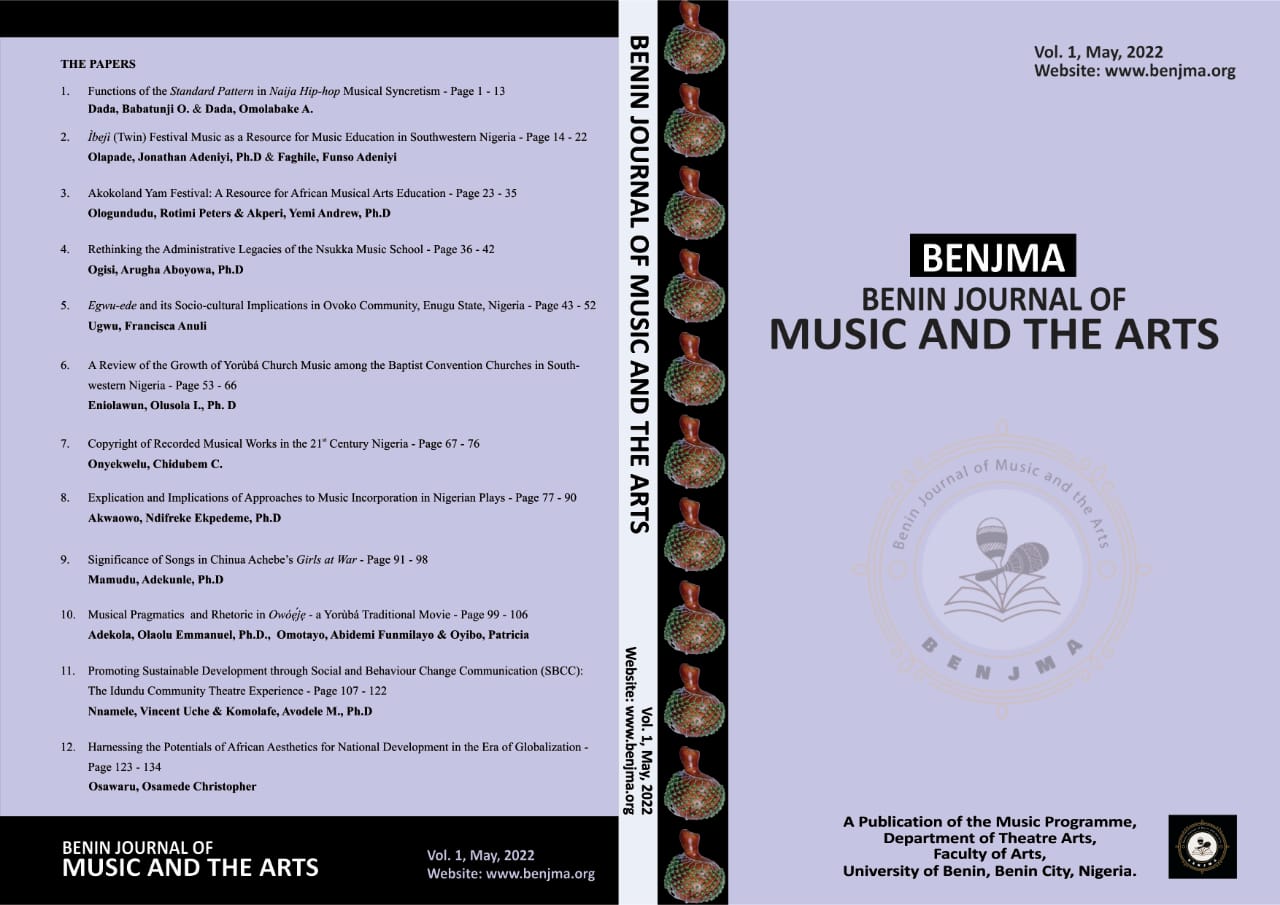
Editorial Note
Editorial Note
The Benin Journal of Music and the Arts (BENJMA), which was established in 2021, is a publication of the Music Programme of the Department of Theatre Arts, Faculty of Arts, University of Benin, Benin City, Nigeria. BENJMA operates an open access policy of internet publication to facilitate easy accessibility and wide readership, and also produces complimentary print versions to meet the desire of readers who would want to obtain hard copies as alternative
and/or supplementary acquisitions. BENJMA is designed to publish at least one (1) Issue yearly, and to undertake the publication of Special Issues from time to time when the need arises.
BENJMA receives and publishes well-researched scholarly articles in music and the arts to promote scholarship and support the dissemination of research findings at local and global levels. It provides the forum for discourses on the historical, contemporary, and evolving subject matters that would serve as bases for the formation of future perspectives, the making of impactful predictions, and the galvanisation of developmental ideas.This present publication, Volume 1, is the maiden edition of BENJMA published in May 2022. This volume is a kaleidoscope of articles on music and the arts, featuring twelve (12) articles from a range of thematic areas such as musical syncretism, traditional festival, music education, music administration, church music, music copyright, music in drama, music in literature, music in movie, theatre for development (tfd), and aesthetics. Readers would most assuredly find the articles interesting, informative, educative, and thought-provoking.
Volume 1 , May 2022
The Church, as the ecclesial community of Jesus Christ, holds the divine mandate of evangelism - a commission rooted in the Great Commission (Matthew 28:19-20) - where gospel music plays an important role. Gospel music serves as both a theological and cultural expression capable of fulfilling this mandate. However, in South-Western Nigeria, the practice of gospel music has witnessed significant deviations: performers with questionable moral and spiritual integrity exploit the art form for fame, wealth, and influence.
Traditional instrumental ensembles remain vital tools for preserving African cultural heritage. However, for the ikon (xylophone) ensemble in Akwa Ibom, Nigeria, there has been a dearth of systematic analytical works. This study, therefore, addresses this gap by examining how musical instruments in the ensemble function as a coordinated system of ‘musical role-play’ that reflects the social organisation and collective identity of the Akwa Ibom people.
This study explores the vital cultural and musical roles women play within Oshimili communities, despite the longstanding myriad of limitations imposed on them by socio-cultural norms. Historically, women in many African communities have navigated a complex landscape of restrictions that confine their participation in communal life. These restrictions extend into musical traditions where certain performances are exclusively reserved for men, hence it taboo for women to participate or even observe musical performances.
Artificial Intelligence (AI) is steadily reshaping various sectors of human life, and transforming the way people work, interact, and access information. In education, AI offers innovative solutions that enhance both teaching and learning processes. This study investigates the application of AI in music education at the Federal College of Education, Okene, with a focus on how AI-driven tools are being incorporated into music instruction, the benefits derived from AI usage, and the challenges encountered by educators and students.
This study investigates the impact of music on sexual performance and satisfaction among individuals in Maryland, USA, spanning generational cohorts aged 18 to 65. Using Arousal Theory and Social Cognitive Theory, the research explores music’s capacity to modulate physiological readiness and shape sexual expectations through learned media associations. Content analysis focused on lyrical themes, tempi, and genre-specific characteristics from locally consumed music datasets, supplemented with secondary data from national sexuality surveys.
